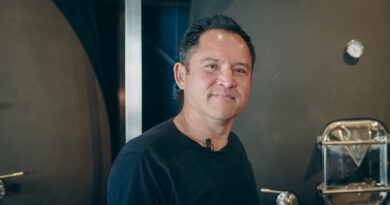The ‘Joan is awful’ effect, and why people working in wine shouldn’t fall for it
‘Joan Is Awful’ is the first episode of the sixth series of Black Mirror, written by Charlie Brooker. It aired in June 2023, and is on Netflix if you want to see it. The premise is that Joan is watching ‘Streamberry’ (which is very similar to Netflix), and she’s looking for something that might be interesting. So she stumbles on ‘Joan is Awful’, which turns out to be based on her, and on what she’s done that day, but portraying her in the most unflattering light as a bad person. It’s AI gone wild: Streamberry realize that the way to really grab viewers is to show them what they actually find most compelling: something negative that others might be thinking of them, all generated from their surveyed daily existence and created by a quantum computer on the basis of all this data. Streamberry are smart. They realize that the negativity of the ‘Is Awful’ brand will prove irresistible to viewers.
Why is it that we find negativity compelling? And how can we stop?
This is a question I often ask myself when I’m scrolling social media, and in particular Linked In. There we find a cabal of wine consumer champions (WCCs) who almost always begin in the same ‘is awful’ way, and it seems to hook readers in.
The wine industry hates consumers, the wine industry is hidebound by tradition, the wine industry alienates newcomers, the wine industry is obsessed with educating people, the wine industry makes wine too complicated and the wine industry is anti-fun and anti-innovation.
These voices have amplified in the last couple of years because there are some genuine structural problems in some segments of wine, and it’s currently proving to be a very difficult marketplace for many producers.
We seem drawn to people who are telling us that we are wrong. ‘Wine is awful’, they say, and by default, if you work in the wine business, you are awful and you are doing it wrong and you are the problem.
But the WCCs tend only to focus on what is wrong, rather than specifying answers to the problems beyond the most facile generic remedies such as listening to consumers, being more inclusive, innovating more and re-thinking everything we do. Still, we read what they say and go away with little more than the sense that the current troubles are because we are awful and we are doing everything wrong. This isn’t helpful.
One of the biggest problems with the WCC approach is that they almost always talk about the ‘wine industry’ as if this were a real, meaningful thing. It’s actually not. What we have in common is wine, but unless you segment the market in a sensible way, then it’s almost impossible to say anything useful. The sensible way to segment the market isn’t by age group cohorts, or any other consumer segmentation, it is by market channel. Think of restaurants. If someone were to say to you restaurants are in trouble because they hate consumers and don’t engage with young people, you would look at them strangely and ask, which restaurants? How much in common does McDonalds (fast food) have with Wagamamas (mid-price chain) or with The Ledbury (Michelin-starred restaurant). I’m sure you could segment in more detail. They are very different, with the thing in common that they sell food to customers. With the wine industry, market channel makes sense in breaking the industry down into segments that can then be considered separately. But WCCs don’t do this, and because of this they rarely have any useful answers. But we listen to them, because we are hooked on the ‘is awful’ bit.
The different segments of the wine market are facing different challenges, but one thing they face in common – and this is independent of how they are performing – is that the market is tight because everything has got more expensive, and people have less discretionary spending money, and this applies in most wine-drinking countries. There’s an economic storm out there, and it is not just the wine industry that is suffering.
The way forward? This will depend on which segment you are talking about. But, please, let’s limit our exposure to commentators or consultants who spend most of the time telling us we are awful, rather than offering useful insights as to how businesses might do better in each of the different segments of the market.




